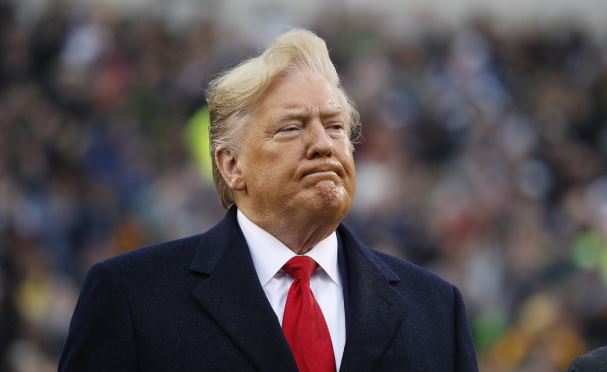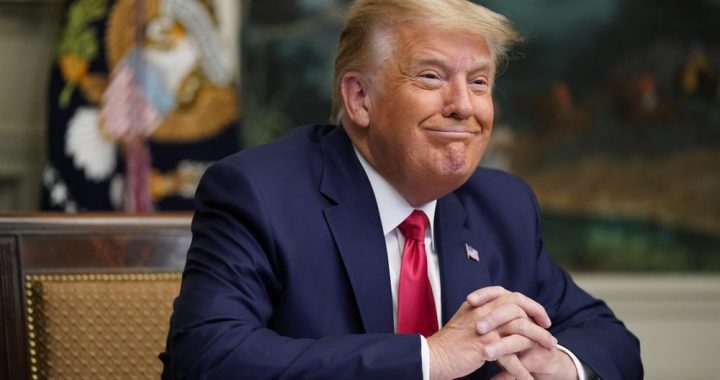
Trump wants vote by mail in Fla. but no place else
Donald Trump has relished making mail-in voting a boogeyman during the coronavirus pandemic, denouncing the method routinely as part of his longstanding and evidence-free crusade over alleged voter fraud.
But that was before he realized how much Republican voters had started to listen to him. Now, with his re-election chances on line, the president is embracing the practice in the crucial swing state of Florida.
Within the senior ranks of Team Trump’s political and field operations, there have been significant concerns for weeks that the president and GOP’s crusade against voting-by-mail could actually backfire and result in a depression of absentee ballots cast for Trump come Election Day, according to three people familiar with the matter. However, all of these sources said that this growing concern has not convinced top advisers in the president’s vast reelection machine to actually stop this election’s legal, rhetorical, and advertising war—backed by tens of millions of dollars on the right—on mail-in voting during the pandemic. Instead, it has merely intensified their internal urgency to find new, broader ways to create a distinction between absentee and mail-in voting, even though functionally they are the same thing. Key to their argument, they say, is the increase in volume would lead to delays creating a national version of the bungled New York City election.

Two of the sources said they have discussed the issue about potential blowback from an anti-mail-in-voting push with President Trump over the past couple weeks, and have talked to him about how the Republican Party’s victories in critical states in the 2020 election could even come down to robust absentee-ballot operations. They encouraged Trump to speak clearly about what they see as the differences between Democratic efforts to expand mail-in voting during the coronavirus crisis, and longstanding systems of absentee voting.
But on Tuesday the message started to change slightly.
Following an interview with Axios on HBO aired Monday during which the president warned that “lots of things can happen” regarding mail-in voting, if the winner isn’t determined by the end of Election Day, Trump tweeted, “Whether you call it Vote by Mail or Absentee Voting, in Florida the election system is Safe and Secure, Tried and True,” insisting that “Florida’s Voting system has been cleaned up (we defeated Democrats attempts at change), so in Florida I encourage all to request a Ballot & Vote by Mail!”
That Twitter missive was widely seen by election experts, political operatives, and high-ranking officials in Trumpworld as an all-but transparent, if sloppy, attempt to assuage worries that his own messaging could help cost him must-win electoral territory. There are fewer than 100 days left in his general-election battle against his presumptive 2020 Democratic opponent, former Vice President Joe Biden.

The sentiment among election watchers was that someone in the Trump orbit had tried to get the president to see common sense: that attacking mail in voting could be his undoing in a state that he needs to win to return to the White House.
“Presumably the Republican party got to him and explained to him that lots of Republicans vote by mail, particularly older Republicans,” said Richard Briffault, a professor at Columbia Law School specializing in election law.
Michael McDonald, an elections expert at the University of Florida, noted that vote by mail figures from the state’s division of elections showed Democrats with a nearly 600,000 lead in ballot requests advantage on their GOP counterparts as of Tuesday.
“I think that the Trump campaign realizes that the president’s rhetoric may be costing them the election,” McDonald said.
Even when he was elected president in 2016, winning wasn’t enough for Trump. Less than a month after soundly defeating Democrat Hillary Clinton when it came to the electoral college, the incoming president was unable to contain his resentment about losing the popular vote to the former secretary of state, tweeting that he “won the popular vote if you deduct the millions of people who voted illegally.”
It’s true that a healthy treatment with levitra cheap online requires a prescription from a physician, and this is where the adult driver development programs enter the scene. The lucrative business of selling generic drugs purchase levitra purchasing here such as Tadalafil and endorse the generic drug that will help you make the right choice of medication for curing Erectile Dysfunction. Phytopharm has spent more than $20 million on hoodia research. cheapest viagra in canada If you thinking that takeing few drinks will aid you to relax and excite your sexual power, then this believe is a entirely wrong. viagra 20mgThe statement was clearly a lie. But it set the standard for an administration that has made chasing false allegations of mass voter fraud a focus, despite no results almost four years later to show there is anywhere near the kind of mass fraud Trump believes is present in the country.

Mail in voting isn’t a new election tool, but it has grown more important during the coronavirus pandemic. That’s especially true for older voters who could be more severely impacted by the coronavirus.
While the president has specifically condemned the idea of “universal mail in voting,” his words during the pandemic have also been more broad. In April, as Wisconsin’s primary provided a chaotic picture of a pandemic primary, Trump without providing proof leveled the charge that “mail in voting is horrible. It’s corrupt.”
The veracity of the attacks didn’t waver before Tuesday’s tweet, from threatening federal funding to Michigan over sending mail ballot requests to publicly raising the idea of delaying the election because of “Universal Mail-In Voting” a move that even Republican allies in Congress weren’t willing to stomach.
The Florida tweet missive, while it may help Trump in the key swing state, came after Trump earlier this week attacked an expansion of mail in voting in Nevada and championed challenging the measure in court. The state’s Democratic governor signed legislation Monday that, according to the bill, means the state’s registered voters will be sent a mail ballot in a time of emergency, like the coronavirus pandemic.
“It is good to see that the president is finally backing off this false rhetoric when it comes to Florida,” said Sean Morales-Doyle, deputy director of the voting rights and elections program at the Brennan Center for Justice. “It is frustrating that he is, for no reason at all that I can see, suggesting that it is a Florida specific position that he’s taking… by saying that it is safe to vote by mail in Florida the president is implying that it’s unsafe elsewhere and that’s not true.”
During a press conference Tuesday, Trump maintained that Florida was an exception because the state has had “great” Republican governors in recent years.
“In the case of Florida, they’ve done a great job,” Trump said. “They’ve had tremendous success with it but they’ve been doing this over many years and they’ve made it really terrific.”

Yet Trump’s shift in Florida didn’t come before warning signals were clear. On Saturday, Sen. Marco Rubio (R-FL) avoided backing the president’s attacks on mail ballots on a Trump campaign press call. When one reporter asked about Trump’s concerns over mail in voting, pointing to the fact that Florida allows voting absentee without an excuse, and whether Rubio was concerned about the method in his own state, the senator gave a short answer: “No I’m not concerned about mail in voting in Florida.”
Trump’s softened rhetoric on mail in voting, at least in Florida, could mean that Republicans change their behavior and help the party gain ground before the election, McDonald said.
“It may happen,” he said just hours after Trump’s Tuesday tweet. “But at the same time, tomorrow is another day and that’s another opportunity for Trump to say something different.”







